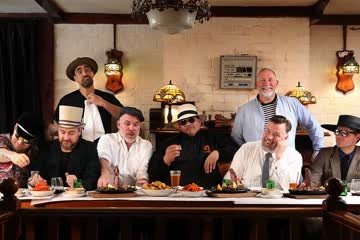Avenged Sevenfold: ‘Our New Album’s As Big As Led Zeppelin Or AC/DC’
Soundwave headliners aim big on Hail To The King

"We wanted this thing to be like the modern version of Led Zeppelin's IV or AC/DC's Back In Black. We wanted it to be gigantic… And I think we achieved that, and I'm really proud of that.”
With the kind of chutzpah you'd expect from someone who adopted the moniker Synyster Gates (real name Brian Elwin Haner, Jr), Avenged Sevenfold's guitarist kicks off our conversation about the band's sixth record, Hail To The King.
It's grandiosity that borders on pomposity – Gates says the band “feels the fire in our loins for these songs” – but few can deny that Avenged Sevenfold have earned the right to entertaining their feelings of grandeur. They've sold around 10 million records in a decade, transformed from a metalcore sensation to rock'n'roll juggernaut and brought an entire generation of kids along for the ride. Most importantly, they've dared to be rock stars in an age where the rock star is dead.
Case in point, Hail To The King. The ballsiest rock'n'roll record you're likely to hear all year. ...King has Avenged Sevenfold taking the direction of 2010's Nightmare to bigger and better plateaus, even if that means scaling back on the chaotic maelstroms that endeared fans to records like 2001's Sounding The Seventh Trumpet and 2003's Waking The Fallen.
Don't miss a beat with our FREE daily newsletter
“When we started off [in the band] it was kind of like, 'Let's just have fun in the studio and write a bunch of ridiculous shit'. And we'd fill albums to the brim with crazy guitar solos and crazy vocals and everything we could put into them. I think that's just being young and having fun, but maturity needs to set in. And that maturity tells us what a song should really convey. We've always felt that we write those epic, grandiose songs. But this time we wanted to do it in a different format. We wanted to have an album that sounded regal, but with relentless, heavy-hitting grooves.
“[To do that] we stuck with the game plan, and stuck with songs until everybody loved them. It was very difficult within those parameters, because we'd never had that. We could always write whatever we wanted before; that's one of the beauties of being in a progressive band.”







